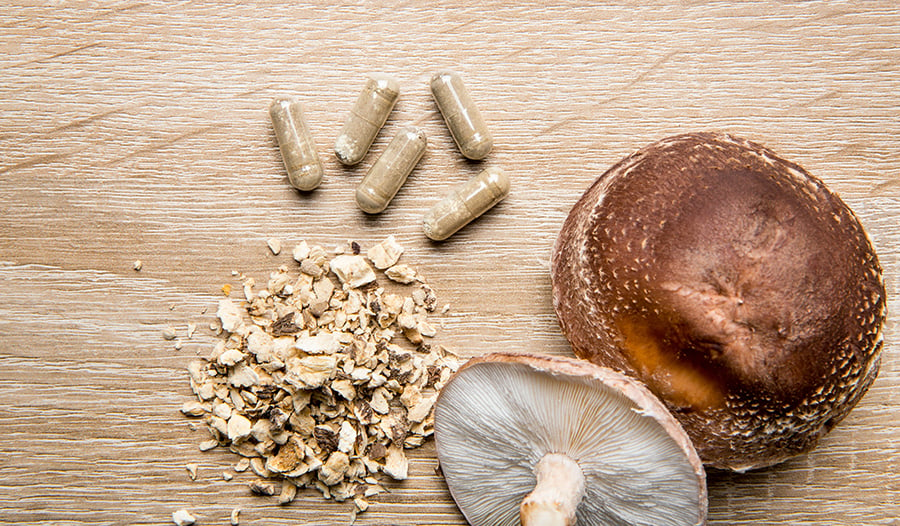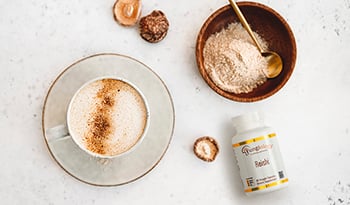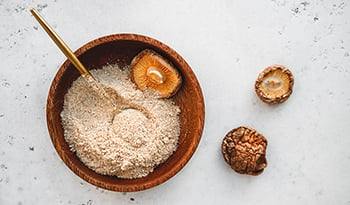Mushroom Extract AHCC May Benefit Immune Health and More
DISCLAIMER:This blog does not intend to provide diagnosis...
- In this article:
- What Is Mushroom Extract AHCC?
- How Is AHCC Made?
- AHCC and Immune System Support
- AHCC and Stress
- AHCC and Liver Health
- AHCC and Fighting Chronic Disease
- Takeaway

Mushrooms can be more than just tasty additions to dishes. These fungi often contain molecules and compounds that may benefit health in several ways.
One of these compounds is the mushroom extract AHCC. Studies suggest that the mushroom extract AHCC may benefit immune health, help support the proper stress response, boost liver health, and bolster chronic disease-fighting properties.
What Is Mushroom Extract AHCC?
The Mushroom extract AHCC is a standardized preparation of the cultured Lentinula edodes or shiitake mushroom. AHCC stands for active hexose correlated compound.
The shiitake mushroom has been used as a medicine and food for thousands of years in Asian cultures. In fact, in ancient Asian cultures, it is thought that the shiitake mushroom was called the elixir of life due to the belief that it could enhance longevity. Since shiitake has been a medicinal food for millennia, is AHCC just a part of the mushroom that needs no special recognition?
How Is AHCC Made?
Fungi, like the shiitake mushroom, have root-like structures called mycelia. The mycelia act as an anchor to hold the mushroom in place in the soil. It also has the important task of bringing nutrients, like minerals, food, and water, to the mushroom.
AHCC is made by cultivating the mycelia of the shiitake mushroom and extracting active ingredients like alpha and beta-glucans, amino acids, and minerals.
Research indicates that AHCC has some amazing benefits for the body. These may include supporting the immune system, improving the body's response to stress, benefiting liver health, and acting as a protective agent.
AHCC and Immune System Support
AHCC may offer a significant boost to immune health.
One study tested AHCC supplementation to support the immune system in eliminating high-risk Human papillomavirus (HPV) infections in women. The study enrolled 50 women over the age of 30 who had a confirmed diagnosis of persistent HPV infection that lasted longer than two years.
HPV attacks the immune system, effectively weakening it against the virus. The longer the viral infection stays in the body, the higher the chance for cervical cancer to develop.
The study involved the AHCC group taking the supplement daily on an empty stomach for six months. The study found that 64% of those in the AHCC group were HPV-negative after six months of supplementation, while only 10% of those in the placebo group were HPV-negative.
AHCC may improve the immune response to a brand range of viral infections, not just HPV.
For instance, animal studies suggest that AHCC may even improve the immune response to influenza by increasing the virus's expulsion from the body.
AHCC may also help support the immune system through its antibacterial properties. One in vitro, or test-tube study, used AHCC against the bacteria Pseudomonas aeruginsosa. P. aeruginosa is a bacteria common in nosocomial or hospital-acquired infections.
For those with a healthy immune system, a P. aeruginosa infection is usually mild but for those who are immune compromised, an infection can be much more serious.
The study introduced AHCC into cells that were infected with P. aeruginosa. The study showed that AHCC slowed the growth rate of the bacteria and reduced its motility. AHCC also was shown the reduce the amount of exotoxin A secretion.
Research suggests that AHCC helps to support immune health through activating and increasing the numbers of both NK and T cells.
AHCC and Stress
AHCC may help improve the stress response in healthy individuals. For example, one double-blind, placebo-controlled crossover study involved 17 healthy male and female participants.
The participants were divided into two groups, and one group was told to take AHCC for seven days. After this, there was a 14-day period in which no intervention was taken. Then participants were asked to take a placebo for five days. The other group followed the same study design in reverse.
Groups were subjected to a test that involved increasing mental stress. The group taking AHCC during the administration of mental stress saw an increase in sympathetic nervous system activity.
The sympathetic nervous system is part of the flight or fight response of the body. It helps increase breathing and heart rates to get more oxygen throughout the body. This study showed that AHCC might help improve the body's response to mental stress.
Another study focused on the benefits of AHCC on long-term stress. The activation of the sympathetic nervous system in response to short-term physical or mental stress can support the body, but long-term stress is a different story. Studies suggest long-term stress is linked to harmful effects like high blood pressure, diabetes, low-grade inflammation, and depression. Chronic stress may even cause the death of brain cells, effectively causing brain rewiring.
AHCC may reduce the effect of long-term stress.
Another study involved seven participants who were experiencing mild depression and long-term stress. This study found that when taking AHCC, the participants recovered from fatigue much more quickly and that the initiation and maintenance of sleep improved significantly. There was also an increase in Natural Killer (NK) cell function.
NK cells are part of the immune system that help kill cells in the body infected with virus cells. A decrease in the number or function of NK cells may lead to increased infections.
AHCC and Liver Health
The liver is the largest solid internal organ in the human body. The liver has many different functions ranging from the metabolism of medicines and producing bile to albumin creation.
A properly functioning liver is essential to life and good health. Unfortunately, approximately two million people die worldwide due to liver diseases like hepatitis and cirrhosis or scarring of liver tissue. AHCC may help to support liver function.
One randomized placebo-controlled study involved participants who had a mild elevation in liver enzymes due to alcohol intake. Elevated liver enzymes are indications that there may be damage or inflammation to the cells of the liver. This study followed participants over 12 weeks to see if AHCC would benefit their liver function tests.
After 12 weeks, the study found a significant lowering of the liver enzyme alanine aminotransferase (ALT) compared to placebo. There was also a marked reduction in the level of inflammatory cytokines, or cell messengers, in the AHCC group compared to placebo.
Another study followed 44 patients with a diagnosis of liver cancer. All of the patients were on supportive cancer care during the study. The study found that those who took an AHCC supplement saw a significant improvement in mental status, general health, and the ability to partake in normal life activities.
Animal studies have also found that AHCC may help to decrease an enlarged liver, reduce the degeneration of liver cells, and enhance the liver's ability to metabolize drugs.
AHCC and Fighting Chronic Disease
The body has a natural chronic disease-fighting mechanism in the form of NK cells. NK cells help to kill abnormal cells, stopping invasive cell growth and proliferation, and preventing tumor cells from moving to other parts of the body.
Research indicates that AHCC may have powerful health benefits due to its ability to increase NK cell proliferation and function.
Animal studies suggest that the potential disease-fighting properties of AHCC may be due to a reduction in the amount of free radical damage in cells. Free radical damage, or oxidative stress, can lead to premature aging and cell death as well as contribute to tumor formation.
One animal study found that AHCC could significantly reduce the number of intestinal adenomas or polyps by reducing damage caused by oxidative stress. Reducing oxidative stress can act as an anti-aging agent, helping improve cell function.
Takeaway
The shiitake mushroom has been used medicinally for centuries to improve health and provide longevity. This is possible due to its exceptional compounds, namely, AHCC.
AHCC is an amazing compound that may have a wide range of benefits. These may include boosting the immune system, improving the body's stress response, benefiting liver health, and chronic disease-fighting potential.
AHCC may be a great benefit to any immune-boosting regimen.
References:
- Asrani SK, Devarbhavi H, Eaton J, Kamath PS. Burden of liver diseases in the world. J Hepatol. 2019;70(1):151-171. doi:10.1016/j.jhep.2018.09.014
- Choi JY, Lee S, Yun SM, et al. Active Hexose Correlated Compound (AHCC) Inhibits the Proliferation of Ovarian Cancer Cells by Suppressing Signal Transducer and Activator of Transcription 3 (STAT3) Activation. Nutr Cancer. 2018;70(1):109-115. doi:10.1080/01635581.2018.1380203
- Corradetti B, Vaiasicca S, Mantovani M, Virgili E, Bonucci M, Hammarberg Ferri I. Bioactive Immunomodulatory Compounds: A Novel Combinatorial Strategy for Integrated Medicine in Oncology? BAIC Exposure in Cancer Cells. Integr Cancer Ther. 2019;18:1534735419866908. doi:10.1177/1534735419866908
- Cowawintaweewat S, Manoromana S, Sriplung H, et al. Prognostic improvement of patients with advanced liver cancer after active hexose correlated compound (AHCC) treatment. Asian Pac J Allergy Immunol. 2006;24(1):33-45.
- Ghoneum M., Wimbley M., Salem F., McKlain A., Attallah N., Gill G. Immunomodulatory and anticancer effects of active hemicellulose compound (AHCC) International Journal of Immunotherapy. 1995;11(1):23–28.
- Khosrowabadi R. Stress and Perception of Emotional Stimuli: Long-term Stress Rewiring the Brain. Basic Clin Neurosci. 2018;9(2):107-120. doi:10.29252/NIRP.BCN.9.2.107
- Kim H, Kim JH, Im JA. Effect of Active Hexose Correlated Compound (AHCC) in alcohol-induced liver enzyme elevation. J Nutr Sci Vitaminol (Tokyo). 2014;60(5):348-356. doi:10.3177/jnsv.60.348
- Mariotti A. The effects of chronic stress on health: new insights into the molecular mechanisms of brain-body communication. Future Sci OA. 2015;1(3):FSO23. Published 2015 Nov 1. doi:10.4155/fso.15.21
- Nogusa S, Gerbino J, Ritz BW. Low-dose supplementation with active hexose correlated compound improves the immune response to acute influenza infection in C57BL/6 mice. Nutr Res. 2009;29(2):139-143. doi:10.1016/j.nutres.2009.01.005
- Shin MS, Park HJ, Maeda T, Nishioka H, Fujii H, Kang I. The Effects of AHCC®, a Standardized Extract of Cultured Lentinura edodes Mycelia, on Natural Killer and T Cells in Health and Disease: Reviews on Human and Animal Studies. J Immunol Res. 2019;2019:3758576. Published 2019 Dec 20. doi:10.1155/2019/3758576
- Smith JA, Gaikwad AA, Mathew L, et al. AHCC® Supplementation to Support Immune Function to Clear Persistent Human Papillomavirus Infections. Front Oncol. 2022;12:881902. Published 2022 Jun 22. doi:10.3389/fonc.2022.881902
- Song D, Li H, Li H, Dai J. Effect of human papillomavirus infection on the immune system and its role in the course of cervical cancer. Oncol Lett. 2015;10(2):600-606. doi:10.3892/ol.2015.3295
- Sun B, Wakame K, Sato E, Nishioka H, Aruoma OI, Fujii H. The effect of active hexose correlated compound in modulating cytosine arabinoside-induced hair loss, and 6-mercaptopurine- and methotrexate-induced liver injury in rodents. Cancer Epidemiol. 2009;33(3-4):293-299. doi:10.1016/j.canep.2009.07.006
- Takahashi M, Fujii G, Hamoya T, et al. Activation of NF-E2 p45-related factor-2 transcription and inhibition of intestinal tumor development by AHCC, a standardized extract of cultured Lentinula edodes mycelia. J Clin Biochem Nutr. 2019;65(3):203-208. doi:10.3164/jcbn.19-36
- Takanari J, Sato A, Waki H, Miyazaki S, Uebaba K, Hisajima T. Effects of AHCC® on Immune and Stress Responses in Healthy Individuals. J Evid Based Integr Med. 2018;23:2156587218756511. doi:10.1177/2156587218756511
- Tena-Garitaonaindia M, Ceacero-Heras D, Montoro MDMM, de Medina FS, Martínez-Augustin O, Daddaoua A. A Standardized Extract of Lentinula edodes Cultured Mycelium Inhibits Pseudomonas aeruginosa Infectivity Mechanisms. Front Microbiol. 2022;13:814448. Published 2022 Mar 16. doi:10.3389/fmicb.2022.814448
- Wu SY, Fu T, Jiang YZ, Shao ZM. Natural killer cells in cancer biology and therapy. Mol Cancer. 2020;19(1):120. Published 2020 Aug 6. doi:10.1186/s12943-020-01238-x

 By Dr. Candace Mathers, N.D.
By Dr. Candace Mathers, N.D.


